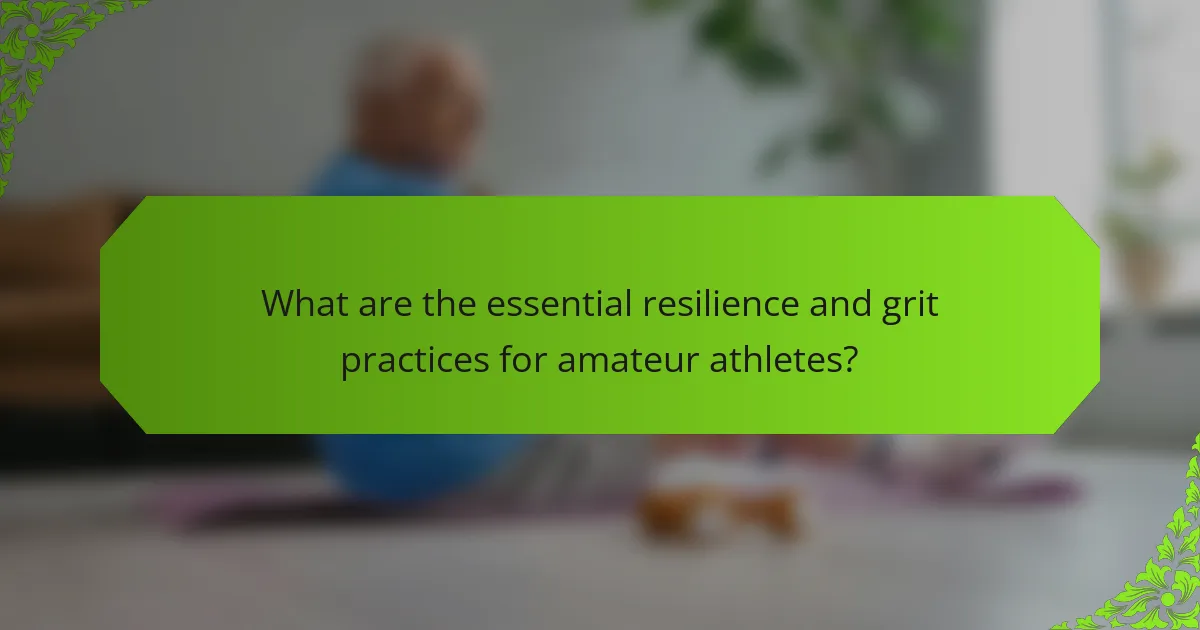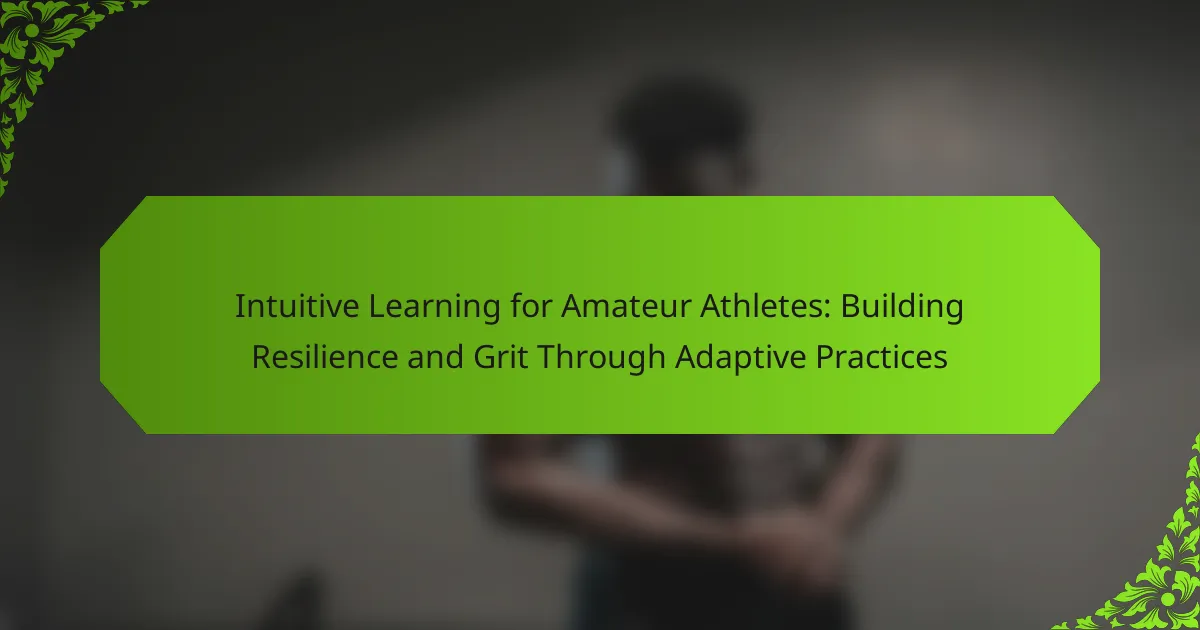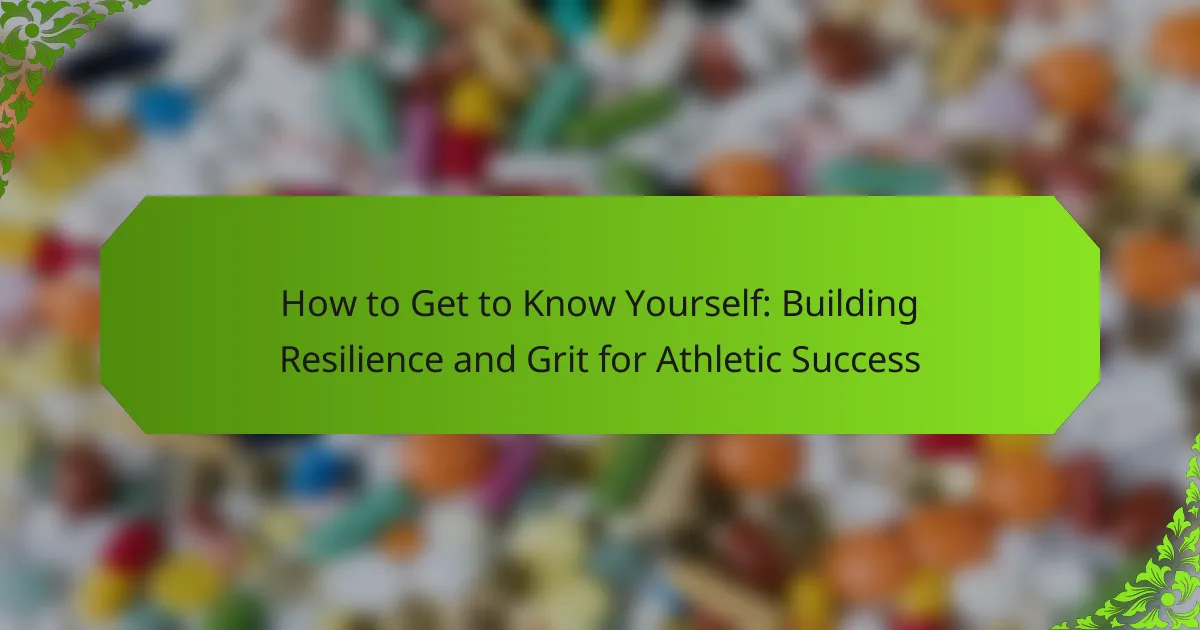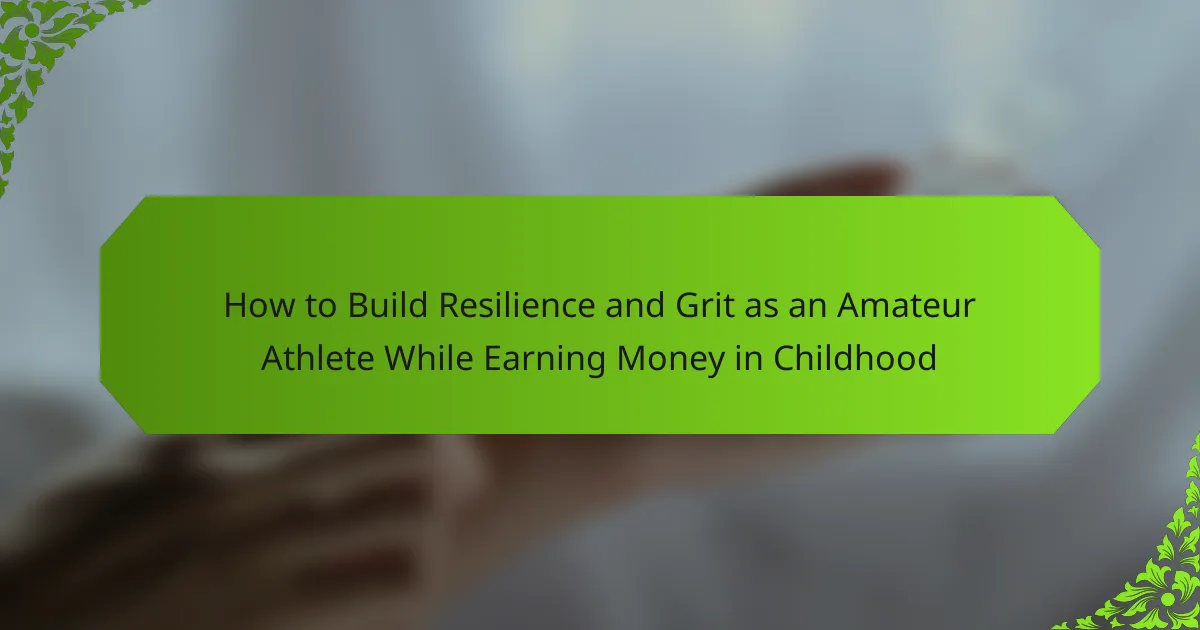Buying a business with no money is a challenging yet achievable goal for athletes. This article explores leveraging resilience and grit, utilising strategic planning, and building a strong support network. It highlights actionable steps for finding partners, identifying transferable skills, and researching low-cost resources. Athletes can apply their unique insights and discipline to navigate the acquisition process effectively.

What are the essential resilience and grit practices for amateur athletes?
Resilience and grit practices for amateur athletes include setting clear goals, maintaining a positive mindset, and embracing challenges. These practices enhance mental toughness and foster perseverance in sports.
1. Goal setting: Define specific, measurable, achievable, relevant, and time-bound goals to maintain focus.
2. Positive mindset: Cultivate optimism and self-belief to overcome obstacles.
3. Embracing challenges: View setbacks as opportunities for growth, learning from failures.
4. Consistent practice: Develop routines that reinforce discipline and commitment.
5. Support network: Engage with coaches, peers, and mentors for motivation and guidance.
How does resilience impact an athlete’s journey in business?
Resilience significantly influences an athlete’s transition into business by fostering adaptability and perseverance. Athletes often face setbacks, which cultivate a unique grit essential for navigating business challenges. This resilience enables them to remain focused on long-term goals despite immediate obstacles. Furthermore, athletes leverage strategic planning, integrating their competitive mindset to identify opportunities and mitigate risks effectively. Resilience serves as a foundation, empowering athletes to thrive in the business realm by transforming challenges into growth experiences.
What role does grit play in overcoming financial obstacles?
Grit is essential for overcoming financial obstacles as it fosters perseverance and resilience. Athletes often face setbacks, and grit enables them to remain focused on long-term goals despite immediate challenges. This determination is crucial when navigating the complexities of buying a business with limited resources. Studies show that individuals with high levels of grit are more likely to achieve their financial objectives, as they are willing to learn from failures and adapt their strategies.

What universal strategies can athletes apply to buy a business with no money?
Athletes can leverage resilience, grit, and strategic planning to acquire a business with no money by utilising creative financing options, forming partnerships, and negotiating favourable terms. Building a strong network is essential for discovering opportunities and securing support. Utilising skills in negotiation can lead to favourable outcomes, such as deferred payments or equity stakes. Additionally, athletes can apply their discipline and focus to research and identify viable businesses that align with their interests and strengths.
How can networking enhance business acquisition opportunities?
Networking significantly enhances business acquisition opportunities by fostering relationships that lead to valuable connections. Engaging with industry peers can uncover hidden opportunities, access to funding, and strategic partnerships. Athletes, leveraging their resilience and grit, can utilise networking to gain insights and mentorship from experienced entrepreneurs. This unique attribute of building a strong network allows for informed decision-making and increases the likelihood of successful business acquisitions without monetary investment.
What skills from athletics translate to business negotiations?
Athletic skills such as resilience, grit, and strategic planning directly enhance business negotiations. Resilience helps athletes navigate setbacks, fostering a strong mindset essential for overcoming challenges in negotiations. Grit, characterised by perseverance and passion, drives athletes to pursue long-term goals, which translates into tenacity in securing favourable business deals. Strategic planning, a core athletic skill, enables athletes to assess situations, anticipate outcomes, and develop effective negotiation tactics, ensuring they remain competitive and successful in the business arena.
How to leverage teamwork skills in business partnerships?
To leverage teamwork skills in business partnerships, focus on clear communication, shared goals, and mutual respect. Effective collaboration enhances problem-solving and drives innovation. Establishing trust fosters resilience, allowing teams to navigate challenges together. Regularly assess team dynamics to ensure alignment with strategic objectives.
What mental toughness techniques can aid in business challenges?
Mental toughness techniques such as resilience, grit, and strategic planning can significantly aid in overcoming business challenges. Resilience allows individuals to adapt to setbacks, maintaining focus on long-term goals. Grit fosters perseverance, essential for navigating obstacles. Strategic planning involves setting clear objectives and developing actionable steps, which enhances decision-making under pressure. These techniques empower athletes transitioning to business, enabling them to leverage their competitive mindset effectively.

What unique attributes should athletes focus on during the acquisition process?
Athletes should focus on resilience, adaptability, and strategic planning during the acquisition process. These unique attributes enable them to navigate challenges effectively and identify opportunities. Resilience helps athletes overcome setbacks, while adaptability allows them to pivot strategies as needed. Strategic planning ensures they set clear goals and allocate resources efficiently, maximising their chances of success in business ventures.
How can goal-setting enhance the business buying process?
Goal-setting significantly enhances the business buying process by providing clarity and direction. It allows potential buyers to define specific objectives, assess opportunities, and prioritise actions. This strategic approach fosters resilience and grit, essential traits for athletes navigating complex transactions. Setting measurable goals ensures that buyers remain focused, facilitating effective decision-making and resource allocation throughout the purchasing journey.
What specific mindset shifts are necessary for athletes transitioning to entrepreneurship?
Athletes transitioning to entrepreneurship must embrace adaptability, risk-taking, and a growth mindset. Resilience enables them to navigate challenges, while grit fosters persistence in pursuing goals. Strategic planning is essential for identifying opportunities and leveraging their competitive edge.

What rare insights can athletes gain from their sports experience to succeed in business?
Athletes gain unique insights from their sports experience that can drive business success. Resilience, developed through overcoming challenges, allows athletes to navigate setbacks in business. Grit fosters perseverance, essential for long-term goals. Strategic planning, honed through game tactics, aids in making informed business decisions. These attributes create a strong foundation for entrepreneurs transitioning from sports to business.
How can failure in sports translate to resilience in business?
Failure in sports fosters resilience in business by teaching athletes to adapt, persevere, and strategise. Athletes learn to face setbacks, which builds grit essential for navigating business challenges. This resilience translates into effective problem-solving and decision-making in entrepreneurial endeavors. For example, overcoming a loss can inspire innovative strategies and a commitment to long-term goals. Resilience, a unique attribute developed through sports, becomes a valuable asset in the business landscape, enabling athletes to thrive despite financial constraints.
What uncommon strategies can athletes use to finance a business purchase?
Athletes can finance a business purchase through unconventional strategies like leveraging their network, pursuing partnerships, or utilising performance-based funding. Building relationships with investors can lead to opportunities for equity financing. Collaborating with fellow athletes or brands can reduce costs and increase visibility. Additionally, performance-based funding allows athletes to secure capital based on their athletic achievements, aligning financial success with their sports career.
How to utilise sponsorships or endorsements as funding sources?
Sponsorships and endorsements can be effective funding sources for athletes looking to buy a business with no money. These partnerships provide financial support while enhancing brand visibility.
To leverage sponsorships, athletes should identify brands aligned with their values and target audience. Building a strong personal brand is essential; it attracts potential sponsors. Athletes should create compelling proposals that highlight their reach, engagement, and unique attributes.
Establishing long-term relationships with sponsors can lead to recurring funding opportunities. Regularly showcasing the partnership’s benefits through social media and events enhances visibility and strengthens the collaboration.
In summary, strategic planning and authentic engagement with brands can turn sponsorships into viable funding sources for business ventures.

What actionable steps can amateur athletes take to start their business journey?
Amateur athletes can take specific actionable steps to start their business journey without money. First, leverage your existing network to find potential partners or mentors. Second, identify your unique skills and experiences that can translate into a business idea. Third, research low-cost or free resources available for business planning, such as online courses and workshops. Fourth, consider bartering services with professionals to gain insights or assistance. Finally, develop a clear business plan that outlines your goals, target market, and strategies, focusing on resilience and grit to overcome challenges.
What are the best practices for assessing business opportunities?
To effectively assess business opportunities, focus on thorough market analysis, financial evaluation, and strategic alignment. First, conduct a comprehensive market analysis to identify trends and customer needs. Next, evaluate financial metrics such as cash flow, profit margins, and return on investment. Finally, ensure the opportunity aligns with your long-term strategic goals, leveraging resilience and grit to navigate challenges.
What common mistakes should athletes avoid when buying a business?
Athletes should avoid rushing the decision-making process, neglecting due diligence, overestimating their business acumen, and failing to seek professional advice. These common mistakes can lead to poor investments and financial loss. Prioritising thorough research and leveraging their network can enhance their chances of success.
How can athletes optimise their resilience and grit for long-term success?
Athletes can optimise resilience and grit through consistent practice, mental conditioning, and strategic goal setting. Building resilience involves developing coping strategies to handle setbacks and maintain focus. Grit is fostered by cultivating passion for long-term goals and persistence in overcoming challenges. Regular reflection on progress enhances self-awareness, while seeking mentorship provides guidance and encouragement. Engaging in team activities strengthens support networks, further reinforcing resilience.



